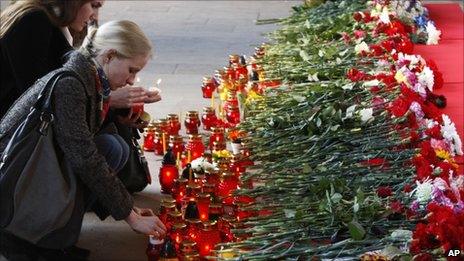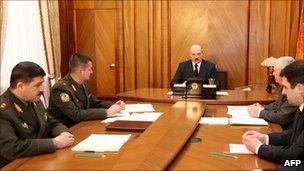Belarusians struggle to explain metro station blast
- Published

Mourners gathered at a memorial by an entrance to the metro station
Belarusians are groping to find an explanation for the massive explosion that ripped through a metro station in Minsk, killing 12 people and injuring more than 200, earlier this week, reports the BBC's David Stern in the city.
Belarus is on high alert after what officials now believe was a terrorist attack.
They say a bomb went off at close to 1800 local time, at the height of rush hour, in the Oktyabrskaya station - one of Minsk's busiest.
The explosive device, which was packed with nails and ball-bearings, and was equivalent to 5kg of TNT, was placed under a bench on the platform, they add. It may have been detonated by remote control.
The Interior Minister, Anatoly Kuleshov, said the aim of the assailants was to "kill as many people as possible".
Memorial
On Tuesday, mourners gathered by the entrances to the metro station, where a spontaneous memorial had sprung up.
Every few moments someone would step forward to lay a flower on one of the numerous rapidly rising piles, or to light a votive candle.

People stood as if rooted to the ground, facing the metro station
In a recess off the street, there was a more formal shrine - six white boards with the names of those killed simply printed on them. In front was a low, red platform where an even bigger pile of flowers was growing.
The crowd, which sometimes grew to a couple hundred, was for the most part silent.
People stood as if rooted to the ground, facing the makeshift monument, their faces etched with disbelief.
"I am in shock," said Lidiya Vintskevich, a journalism student who works at a local radio station. "I can't believe that something like this could happen in our town, we are so small."
The Belarusian security services, which are still known by their Soviet-era acronym, the KGB, said a composite photo of the possible perpetrator was now being circulated.
"The man is of non-Slavic appearance, up to 27 years old, and well-built. He was dressed in a brown coat and a woollen hat," KGB chairman Vadim Zaitsev said, adding that the suspect could have been hired to place the bomb.
The country's deputy state prosecutor also said that several people had been detained, but did not provide any further details.
'No sense'
Belarus has come under increasing political and economic pressure in past months.
The United States and European Union slapped harsh sanctions on the Belarusian government, after it clamped down on the country's opposition following presidential elections last year.

President Lukashenko has promised to turn Belarus "inside out" to find those responsible
President Alexander Lukashenko and other top officials were forbidden from travelling to the West.
Meanwhile the country's central bank is running out of hard currency, and many analysts are predicting a steep devaluation of the currency, the ruble.
President Lukashenko already governs what is considered Europe's strictest authoritarian state. Many Belarusians do support him, however, in part in gratitude for the stability and law and order that he provides.
Mr Lukashenko has promised to turn Belarus "inside out" to find those responsible.
In comments just after the blast, he also said that it could have been an attempt to destabilise the country, and was possibly a "present from abroad".
Many Belarusians are nevertheless at a loss to imagine who would benefit from such an attack.
"I can't imagine why anyone would do this," said Stepan, a local businessman who asked not to use his last name. "I can't imagine what they would gain or what they hoped to achieve. It makes absolutely no sense."
- Published12 April 2011
- Published20 December 2010
- Published18 December 2010